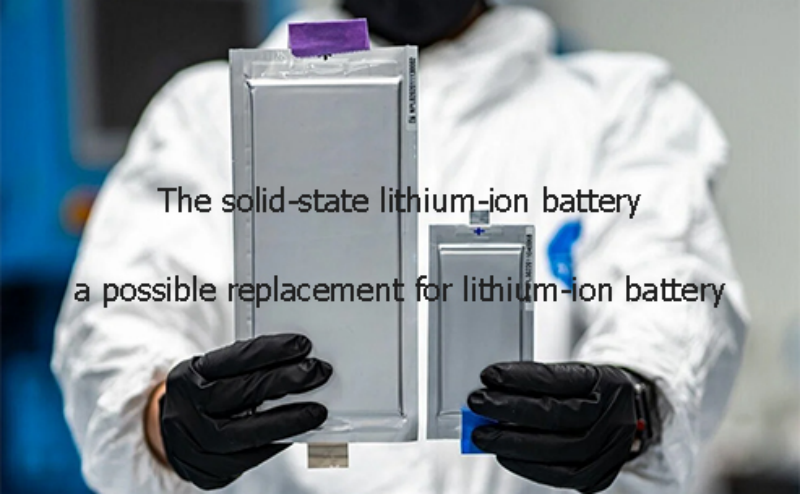
Main content:
- What is a solid-state lithium-ion battery? What is the battery technology used in the solid-state lithium-ion battery?
- How long does a solid-state lithium-ion battery last?
- How long does it take to charge the solid-state lithium-ion battery?
- What is the energy density of a solid-state lithium-ion battery?
- How about the stability and safety performance of solid-state lithium-ion batteries?
- Are solid-state lithium-ion batteries better than other batteries? Will solid-state lithium-ion batteries be the future?
- Why aren't solid state lithium ion batteries in mass production yet? What technical challenges need to be overcome?
- What is the difference between solid-state lithium-ion batteries and common lithium-ion batteries?
Lithium-ion batteries are currently the main energy storage technology for portable electronics, electric vehicles, and grid-level management systems. For example, lithium ion solar battery is widely used in home energy storage. However, commercial lithium-ion batteries have potential safety hazards due to the use of liquid electrolytes containing flammable organic solvents. The development of solid-state lithium-ion battery has become one of the feasible technical approaches to improve battery safety.
1.What is a solid-state lithium-ion battery? What is the battery technology used in the solid-state lithium-ion battery?
Solid-state lithium battery is a kind of lithium battery in which the electrode and electrolyte materials used in the operating temperature range are solid, without any liquid components. The working of solid-state lithium ion battery depends upon which type of solid electrolyte is being used in the cell. At present more than 25 types of solid electrolytes are being used such as polyether, sulfides, oxides, phosphates, etc. Currently, the solid electrolyte materials most likely to be applied to solid-state lithium-ion batteries include PEO-based polymer electrolytes, NASICON-type and garnet oxide electrolytes, and sulfide electrolytes.
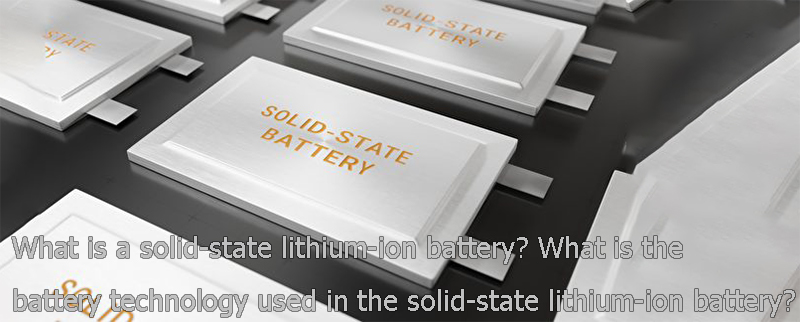
The solid-state lithium-ion batteries use solid electrolytes to replace traditional organic liquid electrolytes, which are expected to fundamentally solve battery safety problems. As an liquid electrolyte-free system, solid-state lithium-ion batteries do not have the risk of thermal runaway caused by the leakage and gas production of traditional lithium-ion batteries using organic solvent electrolytes. Based on this, it is regarded as a strong candidate for the next generation of high energy density and safe energy storage technology. However, according to the current situation, there are still many problems in the industrialization of all-solid-state batteries, which may not be mass-produced and applied in the past 5-10 years.
2.How long does a solid-state lithium-ion battery last?
According to a report from Harvard Gazette, the engineering team designed a solid-state lithium-ion battery. This battery can be charged and discharged 1,000 times. From this point of view, its cycle life is still shorter than that of the widely used lithium iron phosphate batteries.
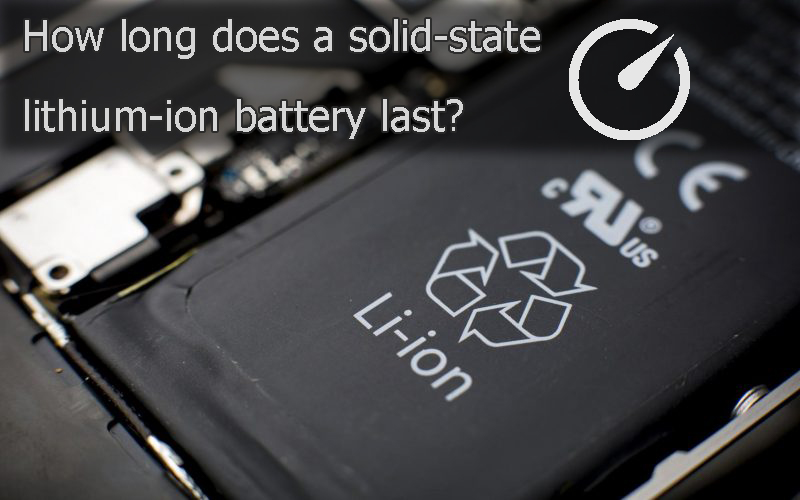
3.How long does it take to charge the solid-state lithium-ion battery?
Solid-state lithium-ion battery can work at high power rate. According to some reports the charging rate of solid-state lithium ion battery is almost six times more than the lithium ion battery technology. The other batteries take several hours to charge completely but solid-state lithium ion battery can be charged to 80 percent in almost 15 minutes.
4.What is the energy density of a solid-state lithium-ion battery?
Since the solid-state lithium battery technology uses a glass compound made of lithium and sodium as the conductive material, it replaces the electrolyte of the previous lithium battery, which greatly improves the energy density of the lithium battery. Its higher energy density and structure allow more charged ions to gather at one end, conduct larger currents, and increase battery capacity. As a result, solid-state batteries will be smaller than current lithium-ion battery while storing the same amount of energy.
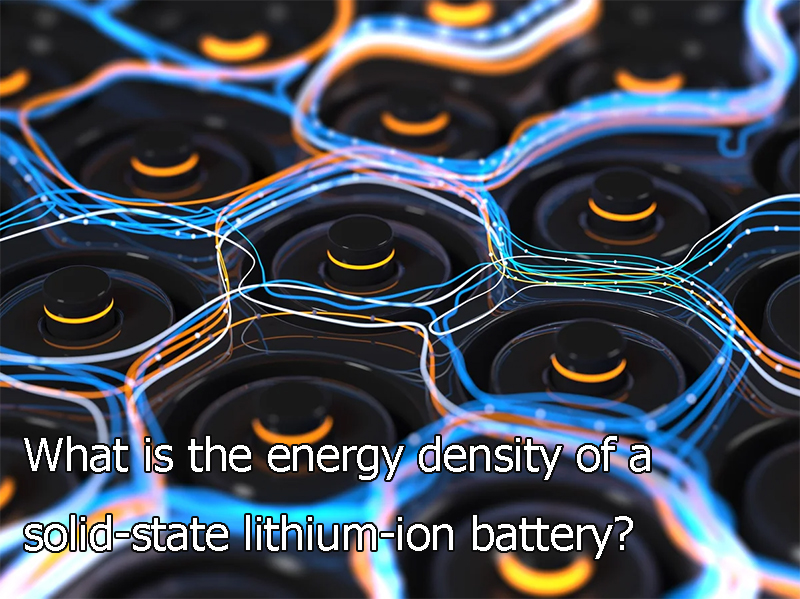
However, in fact, the key to improving the energy density of solid-state lithium-ion batteries is to replace the graphite anode with a lithium metal anode, rather than the material of the electrolyte. In this way, the solid electrolyte has a disadvantage, because the solid electrolyte itself is several times thicker than the liquid electrolyte and the separator, which is bound to have a negative impact on the energy density of the battery.
5.How about the stability and safety performance of solid-state lithium-ion batteries?
Traditional lithium-ion batteries use liquid electrolytes, but most lithium-ion batteries currently use colloidal electrolytes, especially our company's batteries, which are all colloidal electrolytes, so there are no shortcomings in liquid electrolytes such as leakage. This solid electrolyte reduces the safety concerns associated with the use of liquid electrolyte. A separator layer made of solid material is used in this modern technology. This solid material used in the separator layer is much more resistant to high temperature. Therefore it increases the stability of the cell. It also prevents short circuits.
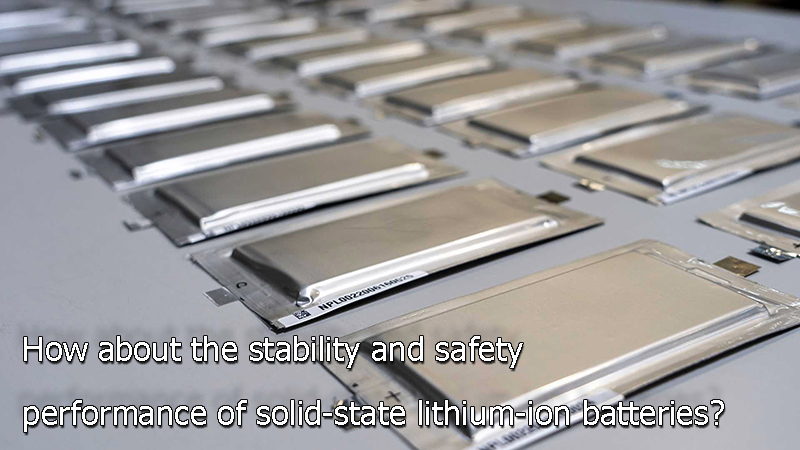
Solid state lithium ion batteries are less stable as compare to current lithium battery technology and degrade at much fast rate. The reason is that in solid state lithium ion batteries lithium ions form irregular clusters while moving from anode to cathode. These clusters of lithium can cleave the battery. This results in causing various problems such as short circuits. But in solid-state lithium-ion batteries because a solid separator is used. This solid separator is thicker and more resistant to damage which occurs due to the branching of lithium. Therefore it prevents the risk of short circuits and gradual decay of the cell.
6.Are solid-state lithium-ion batteries better than other batteries? Will solid-state lithium-ion batteries be the future?
Among all the batteries that have been commercialized at present, lithium-ion batteries are already the most superior batteries, with great advantages in terms of lifespan, energy density, self-discharge rate, weight, environmental friendliness, and no maintenance and no memory effect. Solid-state lithium-ion batteries give many benefits over the current lithium ion battery technology. They are better than other batteries due to their long life, safety, small size, and higher energy density.
But this solid-state lithium battery technology is still developing and there are still some key issues remain to be solved. In addition, the cost of solid-state lithium batteries is high, so its mass production and application are still far away from us. And currently, lithium batteries are the best battery technology on sale. Because these batteries are readily used, produced in huge amounts, have different chemistries, and are used for various purposes.
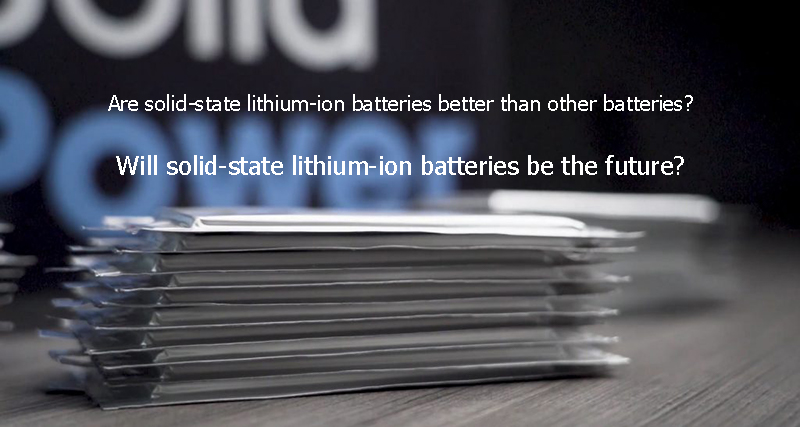
As technology progresses, the use of gel electrolytes has basically solved the safety problem. At the same time, if applied to future lithium metal batteries, the use of gel electrolytes can also achieve a comprehensive improvement in battery performance. More importantly, if lithium metal batteries use gel electrolytes, they can be developed based on the existing industrial chain, which already has a solid foundation for mass production. Looking forward to the future development trend, solid-state lithium-ion batteries may become a better choice, but it needs to be clear that their industrialization is still unrealizable in the short term.
7.Why aren't solid state lithium ion batteries in mass production yet? What technical challenges need to be overcome?
Solid-state lithium-ion battery technology is still young and has certain limitations that need to be addressed. Let's discuss some of the major challenges. The first challenge associated with solid-state lithium-ion batteries is the problem of stability. The solid-state batteries are very sensitive to these natural changes during battery charging and discharging, the diameter of anode increases and decreases respectively when battery is charged and discharged.Such movement disrupts the compact, precise arrangement of solid-state materials, which will ultimately cause the battery to collapse if this behavior cannot be controlled or engineered.
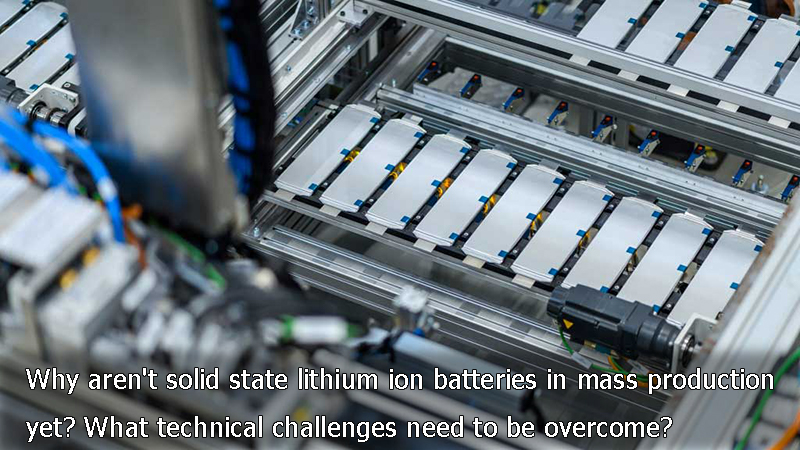
The solid separator used in solid-state cells works at an elevated temperature. The performance of the battery improves at higher temperature. As this is very difficult to always maintain such a high temperature in the battery , therefore solid state batteries are not being widely used in automotive industry. To prevent dendrites an excessive layer of lithium ion is needed between separator and anode so that lithium deposits easily on anode. But this excessive lithium layer has two disadvantages.
First one is that the energy density loss and second one is the increase in the cost of the battery. The solid-state batteries have short life cycle as compare to current lithium batteries. The reason is that it is very difficult to maintain association between the solid surfaces. Due to this poor contact the battery can not delivers to its hundred percent capacity. This is one of the hurdles in the industrialization of solid-state lithium ion battery. The cost of solid-state lithium-ion batteries is much higher. It is not estimated yet what would be the final cost of this technology.
8.What is the difference between solid-state lithium-ion batteries and common lithium-ion batteries?
The key difference between the solid-state lithium-ion batteries and common lithium-ion batteries lies in the fact that the latter contains a liquid/gel electrolyte as opposed to a solid electrolyte. Ordinary lithium-ion batteries use organic liquid electrolytes, usually in the form of gels and polymers, which make it difficult to lose weight. In addition, electrolytes are also flammable, unstable at high temperatures and may have problems with thermal runaway.
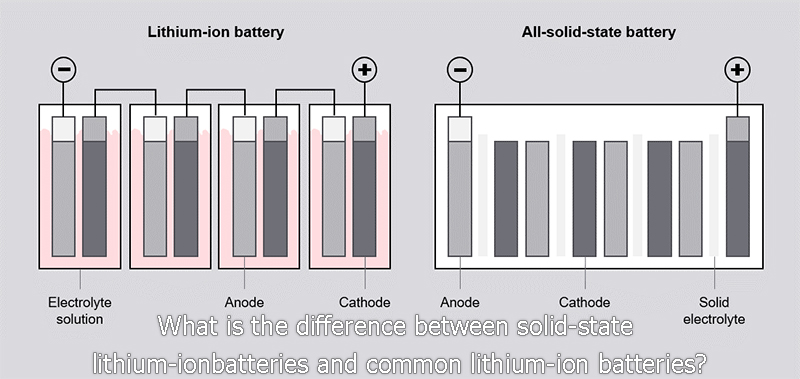
As for solid-state lithium batteries, they don't have a heavy liquid electrolyte inside, but a solid electrolyte in the form of glass, ceramic, or other materials. Therefore, solid-state lithium batteries have a more compact internal structure, smaller volume, higher energy density and thermal stability. In fact, lithium ion battery high energy density makes it already the lightest of all commonly used batteries.
















